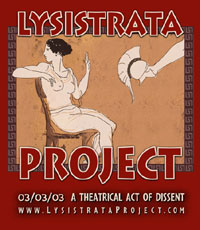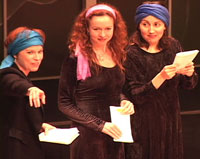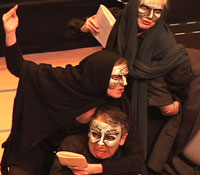|
 |
| Internationalt Lysistrata Project: let's make
love, not war. |
Have you ever heard of "International Lysistrata Project"? On March 3,
2003, fifty-nine countries hosted 1,029 readings of Lysistrata,
Aristophane's anti-war comedy,
to protest the Bush Administration's unilateral war on Iraq.
Readings were held in theatres large and small, schools, churches,
libraries, in music halls, homes, cafes, community centers, clubs, subway
cars, parks, and on street corners. More than 300,000 people attended
readings organized by the 1,029 Lysistrata Project "spearheads." 
Readings raised an estimated $125,000 for non-profit organizations
working for peace and humanitarian aid. Some readings didn't raise money,
but the fact that they occurred at all resonated as a powerful symbol of
world citizens united for peace. For example, a secret reading in northern
Iraq was organized by members of the international press corps, who had to
keep quiet about it or risk losing their jobs.
The international
Lysistrata Project participants earned the news coverage they received. The Project was
featured on multiple CNN news programs, PBS' Lehrer News Hour, and many
network and local news programs. Dozens of radio programs featured stories
about the project, including NPR's All Things Considered and Dutch,
French, German, Canadian, Japanese and Greek stations.
 Voice of the Lysistrata
Project Voice of the Lysistrata
Project
 The idea for Lysistrata Project was hatched in early January 2003, when New York
actresses Kathryn Blume and Sharron Bower were inspired by Theaters
Against War (THAW) to actually do something about their feelings regarding
the war on Iraq. The idea for Lysistrata Project was hatched in early January 2003, when New York
actresses Kathryn Blume and Sharron Bower were inspired by Theaters
Against War (THAW) to actually do something about their feelings regarding
the war on Iraq.
Kathryn Blume says that the purpose of the Lysistrata Project is not
education, but expression, and above all, "to make it clear that President
Bush does not speak for all Americans."
"Though we are not necessarily suggesting these tactics be used to end
this war, Lysistrata provides a humorous entree into a healthy
community dialogue: What CAN the women do on a local level to stop
"diplomacy by violence" in our world?"
Interviewed on NPR in January, Blume said the worldwide act of
theatrical dissent aims to engage participants and audiences in antiwar
dialogue. One of the hopes is to provide an alternative to the constant
stream of war talk issuing from the White House and dominating the mass
media.  About the play
Lysistrata About the play
Lysistrata
 Lysistrata, a comedy by Greek dramatist Aristophanes (447 -
385 BC), tells the story of a group of women from opposing states who
unite to end the Peloponnesian
War . Lysistrata, a comedy by Greek dramatist Aristophanes (447 -
385 BC), tells the story of a group of women from opposing states who
unite to end the Peloponnesian
War .
After matronly stormtroopers take over the building where public funds
are kept, the women rise to end the war by withholding sex from their
mates -- Until, desperate for intimacy, the men finally agree to lay down
their swords and see their way to achieving diplomatic peace.
The original Lysistrata was performed to a war-weary audience
that had already endured two decades of civil war and still had seven more
to go. The Athenians' army was decimated, their economy was in ruins, and,
as they didn't have enough problems, they had recently undertaken a
disastrous invasion of Sicily that wiped out nearly their entire fleet.
But Aristophanes knew how to please an audience; like all his
theatrical works, Lysistrata is a fantasy and a happy one at
that. Lysistrata helps negotiate a truce between Athens and Sparta and
peace is restored across the land. The men lay down their swords,
Lysistrata and her sisters open their arms (and their legs) and the
bedrooms of Greece echo with the moans and sighs of conjugal bliss. Not so
far out, really, when you think about it.
 Background Background
阿里斯托芬的《莉西斯特拉忒》首演于公元前411年,是现存最早的一部以女性为出发点,并针对反战立场而与男性抗争的剧本。类似像《莉西斯特拉忒》这类描写一群女性的作品,阿里斯托芬还有另外两部:Thesmophoriazusae和Ecclesiazusae。
古希腊语中,Lysistrata含有“解散军队”的意思,剧本意在抗议Peloponnesian
War战争。阿里斯托芬的新颖之处在于,他选择了两个非常通俗的元素“性”与“钱”来作为要挟停战的工具,并且在剧本中加入了大量的“性暗示”和黄色笑话。整个故事在作者巧妙的构思之下变得有趣而不枯燥,观众也可以明确地了解“性”与“钱”只是手段,政治的诉求才是剧本的主题。
关于角色的描述,Lysistrata明显地不同于以往戏剧主角,她并不是一个丑角,而是一个有智慧和有意志力去贯彻其理想的女性。她的成功也不是一蹴而就的,而是经过许多的波折和困难。阿里斯托芬也在句中描述了当时希腊男女在社会上的不同处境,以及世俗观念对他们的期待和约束。
由于其“反战”的主题,《莉西斯特拉忒》成为阿里斯托芬最常被搬上舞台的剧作之一。1872年,奥地利剧作家Ludwig
Anzengruber曾将《莉西斯特拉忒》改编为“Die
Kreuzelschreiber”(《十字划押的人》)。美国历史上第一位黑人奥斯卡影帝Sidney
Poitier(西德尼·波蒂埃)就是由于在百老汇歌剧《莉西斯特拉忒》中的出色表现,才逐步走上荧幕的。
 Links Links
http://www.sparknotes.com/drama/lysistrata/summary.html 戏剧
Lysistrata 学习指南
http://www.gansudaily.com.cn/20030306/602/2003306A00612017.htm (新闻)美国女艺人号召妇女"性罢工"反战
http://column.bokee.com/5441.html (新闻)从大街到舞台,好莱坞正在对美国对伊战争发起进攻
(英语点津陈蓓编辑) |